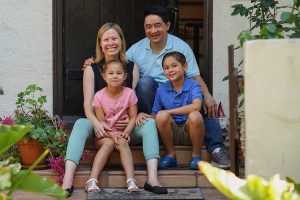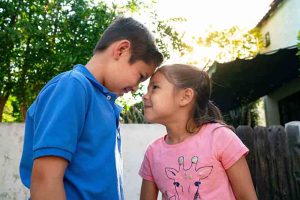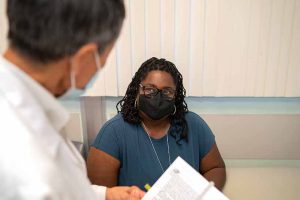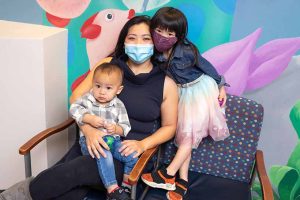Patients are pivotal in COVID-19 vaccine research
 One of the most remarkable achievements during the pandemic has been the rapid development of COVID-19 vaccines. This could not have been achieved without the willingness of people around the world to volunteer for vaccine clinical trials.
One of the most remarkable achievements during the pandemic has been the rapid development of COVID-19 vaccines. This could not have been achieved without the willingness of people around the world to volunteer for vaccine clinical trials.
Volunteers essential for study success
“The unsung heroes of the pandemic are the people who bravely volunteered to participate in the clinical trials for these new vaccines,” said William Towner, MD, FACP, FIDSA, regional physician director for the Division of Clinical Trials Research and the principal investigator for the COVID-19 vaccine trials at Kaiser Permanente Southern California.
Between August 2020 and June 2022, nearly 370 people, including 190 children, volunteered for COVID-19 vaccine trials at the Kaiser Permanente Los Angeles Medical Center.
“In my career, I have never seen so much enthusiasm for participating in clinical trials, including from parents of young children,” said Dr. Towner. “I am deeply grateful to each and every one of them. We could not have gotten where we are today without them.”
Kids pave the way for peers
Aidan Shih feels strong enthusiasm about his decision to participate in COVID-19 vaccine research. “I was of course excited that I would get the vaccine — I would be more safe from COVID — but I was also thinking about how a lot of other children my age could get the vaccine if I went to the trial,” he said.

In May 2021, Aidan’s parents, both physicians with the Southern California Permanente Medical Group, enrolled him and his sister, Avery, in a trial studying the COVID-19 vaccine in children ages 12 and younger. Their mother, Erin, had already participated in a COVID-19 vaccine trial at Kaiser Permanente Southern California in 2020.
Aidan, now 12, said he found participating in the trial to be straightforward. “They told me I was going to get the vaccine and it was going to be a trial, so they would see my reactions to the vaccine. It was very exciting and I thought it would hurt, but it didn’t … My arm was a little sore afterwards, but it was fine overall.”
Erin and her husband, Stephen, said that after Avery got her first shot, she asked if she could hug her grandmother. “The COVID vaccine allows us to do things like that again, like give family members hugs, and go to school in person, and just kind of do normal everyday things again,” Erin said.
A return to normalcy is just what kids like Aidan and Avery, now 7, have craved. “It was definitely hard,” Avery said of her time during the pandemic. “We all had our masks on, which we really wanted to take off.”
Aidan said they both started off the school year with online learning, which was especially challenging because he had just switched to a new school for fifth grade. “So I was kind of meeting people online, but then we slowly got back into in-person school, which was much better — much, much better,” he said.
Would Avery encourage her friends to get vaccinated for COVID-19? “Of course. I mean, it would be great, and it would help,” she said. Aidan agreed: “I definitely would. There’s nothing really bad about it,” he said. “The vaccine does help you not get COVID, of course, but then also it helps you so you don’t spread COVID. So, if enough people get the vaccine, COVID will slow and hopefully eventually stop.”
Easing vaccine hesitancy
Deciding to volunteer for COVID-19 research can be far more complicated for people of color due to historic and previous negative experiences with health care. This was true for Kaiser Permanente member Elizabeth Gordon, who is Black.
 “I had seen a number of reports of other people who were participating in the trial and hearing their reasoning as to why they wanted to participate,” she said. “I thought, ’Wow, I don’t know if I could ever do that.’”
“I had seen a number of reports of other people who were participating in the trial and hearing their reasoning as to why they wanted to participate,” she said. “I thought, ’Wow, I don’t know if I could ever do that.’”
That’s when Elizabeth happened to receive an email asking if she would like to volunteer for a COVID-19 vaccine trial herself. At the time, she said, she was very distrustful of the U.S. government and, by extension, wary of the vaccines they were helping to create.
“So, I wanted to research for my sake, for my family’s sake, to understand how it was being funded, who was making it, and who was designing it,” she said. Eventually, she decided, “This is something that’s going to be safe, that they’re doing it in the right way, for the right reasons.”
Elizabeth decided to enroll — not only for herself, but because she realized her participation could contribute in a larger way to her community. “I wanted to be able to say, ’Look, I’ve taken it. It’s safe,” she said. “I’ve done my homework. You can take this and trust that it’s going to work for you and protect you.’”
“I already knew that there was going to be hesitancy, especially within the Black and brown communities, to take the vaccine,” she said. Members of her family have either directly faced discrimination in medical care in the United States or grew up hearing of others’ experiences, such as the racist and deadly Tuskegee experiments.
She received her first dose in September 2020. The side effects were mild; her arm was sore, and she needed some extra sleep for the first 2 days or so. She had a slightly stronger reaction to her second dose, but said that it still did not feel very different from a flu vaccine.
Now, Elizabeth hopes that sharing her experience will encourage others to get vaccinated. “I don’t like having my information or image out there, but if it helps even just one person or one family feel that they can trust this, that they can take this vaccine, that they can protect their family and their loved ones, then it’s all worth it,” she said.
Vaccines for the youngest kids
When architect Tammy Sam heard that a clinical trial testing the effectiveness of the COVID-19 vaccine had opened up for children 5 and under, she applied right away. “I believe in science,” Tammy said. “We all need to do our part to help, and I felt confident involving my kids because I had already gotten vaccinated, and we knew it was pretty safe.”
 Tammy and her husband, Joe, have 3 kids: 5-year- old Kylie, 3-year-old Brucie, and 1-year-old Joshie. Kylie and Joshie are participating in the trial, but Brucie wasn’t eligible due to a congenital heart condition.
Tammy and her husband, Joe, have 3 kids: 5-year- old Kylie, 3-year-old Brucie, and 1-year-old Joshie. Kylie and Joshie are participating in the trial, but Brucie wasn’t eligible due to a congenital heart condition.
Kylie and Joshie, who were 4 and younger than 1 when they joined the trial, have each received 2 doses of either the vaccine or a placebo.
“Joshie is, of course, not old enough, and Kylie is not quite old enough, to understand how they are contributing,” Tammy said. “I told Kylie she is doing a good thing, and she’s like, ’Okay, but this hurts!’ I plan to remind them when they’re older that they played a small but important part in human advancement.”
Although Tammy wishes she could have known sooner whether her kids got the vaccine or the placebo, she said the trial has been a smooth experience. The same day she applied, she heard back that Kylie and Joshie had been accepted. And she appreciates the user friendliness of the online tool used by the researchers to routinely capture parents’ observations of their children.
“They have made it very simple to answer all the questions about things like whether your kid spiked a fever today, were they in contact with anyone with COVID-19, or were there any changes in health,” Tammy said. “I was very impressed by how easy this process is.”
Now, the family is making sure to have some fun before Brucie has heart surgery later in the summer. The kids are regulars at their playground and recently visited Legoland.
“It’s been hard because Brucie was already quarantined before COVID-19 even came around,” Tammy said. “We want to make sure all the kids experience as much as they can — safely — before his next procedure.”
Tammy said that enrolling her kids in this trial gave her a newfound appreciation for participants in the initial safety and dosing trials. “It must have been scary to be one of the first to get vaccinated. But they knew that, later, it could potentially save millions of people.”





